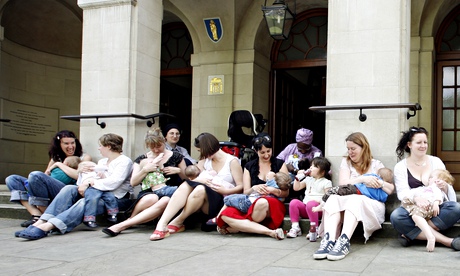Karlesha Thurman wasn’t looking for controversy when she posted a picture of herself breastfeeding at her graduation ceremony on Facebook. “I found out I was pregnant [in] my last year of college,” the 25-year-old American wrote. “She was my motivation to keep going, so me receiving my BA was OUR moment.”
Nevertheless after the image went viral, Thurman faced an onslaught of sexist criticism. Commenters bemoaned her “inappropriate” behaviour; others indulged in some misogynistic name-calling. “Nobody told her to hoe around in 3rd period She should’ve been doing her work & maybe she wouldn’t be breastfeeding during her graduation”, offered one charming Twitter user.
Thurman’s online abuse is the latest in a seemingly never-ending stream of mother-shaming media stories. From Instagram guidelines that censor breastfeeding images to UK-wide “nurse-ins” responding to a mother being called a “tramp”, there is barely a week that goes by without a story of someone being told to breastfeed in the toilets.
For some, the media are simply getting their nursing bras in a knot over nothing. Emma Pickett of the Association of Breastfeeding Mothers thinks that for the vast majority, breastfeeding in public is nothing unusual: “Most people see a photo like Karlesha’s and think, ‘lovely’ or nothing at all, and look at the cat picture that comes next on their feed.”
I breastfed my eight-month-old son in a cafe while writing this piece and received only positive comments about my capacity to multitask. While I accept that most people don’t suffer serious abuse for breastfeeding, there are strong arguments for why stories like Thurman’s shouldn’t be brushed aside. As Marcia Lord, vice-chair of Doula UK, explains: “If we tolerate this we are perpetuating the myth that women using their breasts for something other than the male gaze is somehow disgusting. Women are increasingly looking for their breastfeeding support online but often come across stigma and condemnation instead.”
This has to be bad news for new mothers, the majority of whom want to breastfeed. Yet with UK rates falling for the first time in 10 years, confusion about whether it’s OK to feed your baby outside of a toilet stall cannot be helping matters. This is particularly true for young mothers for whom social pressures contribute to low breastfeeding rates. African American women such as Thurman are also less likely to breastfeed, though in the UK statistics suggest that black and Asian mothers have the highest breastfeeding rates.
Damaging as this might be for breastfeeding, the issue goes far beyond the frankly boring-by-now breastfeeding debate. It really doesn’t matter to me how a woman chooses to feed her baby as long as she is well informed, well supported and happy with her decision, which sadly we know many women are not.
The shaming and abuse of women on and offline, the ridiculing of their choices, the commentary on their bodies and the infringement of their basic human rights is, of course, a much bigger problem. That breastfeeding mothers, simply going about their daily business with a hungry infant in tow, can be at the sharp end of this is indicative of the scale of this wider issue.
It is for this very reason that Twitter-user @ish_chel polices the social networking site engaging with those who mother-shame. While reading her conversations isn’t good for the blood pressure, she is compelled to stand up for those invisible mothers, as she believes “women need to feel that they won’t be attacked when they are responding to their baby’s most basic needs”.
This isn’t a breastfeeding problem. It is an issue that feminists need to take up, especially those who haven’t yet engaged with the inequalities women face when they become mothers.
In the meantime, I am about to feed my baby in public again. It’s not quite aTalullah Willis-style topless demonstration, but while there are still people who don’t get the irony in Sparrow Folk’s Ruin Your Day With Tits, I reckon I can add protester to my CV.



